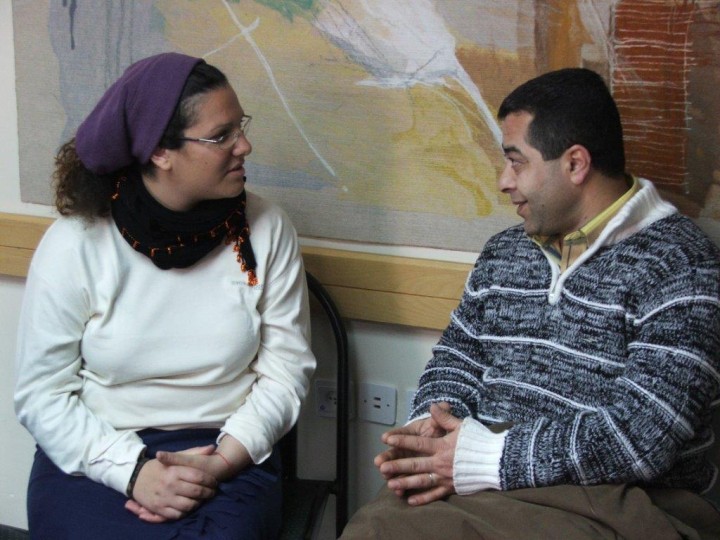Karen Feuer: a Jewish Woman engaged in Interfaith Dialogue in Israel
by Milena Rampoldi, ProMosaik e.V. – Even if we know that the Israeli-Palestinian conflict is not a religious one, we are convinced that interreligious dialogue and empathy, interpersonal peace-building can help to start our path to peace and mutual understanding. We talked about it with Karen Feuer, an Israeli-American woman involved in the activities of the Interfaith Encounter Association (IEA). See also our interview with Dr. Yehuda Stolov of the IEA:
http://promosaik.blogspot.com.tr/2015/10/promosaik-ev-interviews-yehuda-stolov.html
Milena Rampoldi: ProMosaik e.V. is convinced that the interreligious dialogue is very important to promote a culture of peace and mutual understanding. What do you think about it?
Karen Feuer: Yes, of course. The more we talk to each other and sit in the same room with each other the more we promote peace.
MR: How important is the interpersonal relationship to struggle against discrimination and racism in your society?
KF: Once you know people personally – even just their names – you naturally dispel stereotypes and are less likely to generalize about any given group. It is very easy to label a faceless, nameless group of people as “terrorists” for example, but when you know individuals — even just a few — you really can’t generalize anymore. Therefore, these meetings are very important.
MR: Which are the most important obstacles of an authentic interreligious dialogue?
KF: We are still afraid/not ready to discuss differences. We’re still at the stage of building up trust and getting to know each other in a purely positive way and therefore we avoid difficult topics, at least officially. This is why in our Interfaith Dialogue groups we share only on topics on our religions and we seek out what we have in common and not what divides us. This is an important stage, but sometimes it’s frustrating to me personally because I feel as though the bridges we are building aren’t that strong. What will we do when we disagree? We don’t yet have tools for that. Once in a while, over snacks, hard issues will come up but everyone is hesitant to address anything difficult because we are very focused on staying positive and friendly.
MR: I am convinced that the conflict in the Middle East is not a religious, but a geo-political one. But I think that in any case interreligious dialogue can help people to achieve peace, away from politics. What do you think?
KF: Coming together to discuss anything is building peace because as I said above, you don’t generalize as easily when you know names and faces.
As the mother of five children I can tell you that conflict is an intrinsic part of the human experience. You don’t necessarily need a “reason” to want to have a fight with someone. We need to find ways to disagree without hurting/killing each other (true in a household as well as a country!)
MR: What do peace and justice mean to you?
KF: Peace and justice go hand in hand and I moved to Israel (from America) 14 years ago because this country, located at the crossroads of the world, containing all the worlds conflicts within it in such a tiny piece of land, has the potential to offer a model of peace and justice for the whole world. Obviously we are not there yet but in such a small country, we actually could achieve it. It’s a place where a small group of people can truly make an impact. I hope I will see this country become more just and more peaceful in my lifetime.
I live in Maaleh Adumim. I have been involved in Interfaith dialogue with Interfaith Encounter for over 5 years. I can’t say our dialogue group has made an impact on the country but I can for sure say it’s impacted each and everyone of its members and that is also very significant.
– See more at: http://www.promosaik.blogspot.de/2015/10/karen-feuer-jewish-woman-engaged-in.html#sthash.o8mOH1Jm.dpuf










